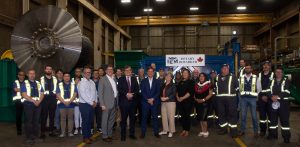
Photo credit: @IndustrialEquipmentManufacturing
BRITISH COLUMBIA – The Federal Government has announced a joint investment of $195 million to upgrade key highway infrastructure in B.C.’s northwest needed to support critical minerals development in the region, improve community access and safety, and create good mining jobs across the province. The accouncement was made at Industrial Equipment Manufacturing Ltd. in Surrey.
Supported by collaboration between governments and funded through the Critical Minerals Infrastructure Fund, a flagship program under the Canadian Critical Minerals Strategy, this project has been conditionally approved to support the development and operation of several copper, molybdenum, zinc, nickel and cobalt projects in B.C.’s Golden Triangle region. The federal contribution totals up to $75 million with the remaining $120 million being funded by B.C.’s Ministry of Transportation and Infrastructure.
“Highway infrastructure improvements in Tahltan Territory and the Golden Triangle will advance the development of B.C.’s critical minerals potential by facilitating investment in this vitally important B.C. mining region. Planned improvements will enable safe goods and services movement and industry growth which, in turn, will create jobs and contract opportunities through B.C. including urban centres like Surrey and Vancouver where $1.4 billion in goods and services were purchased by the mining industry from 1,125 companies in 2022. Critical minerals offer a generational opportunity to build prosperity for all British Columbians,” said Michael Goehring, President & CEO of the Mining Association of B.C.
The Northwest BC Highway Corridor Improvements Project is a key action of B.C.’s Critical Minerals Strategy, a top priority for the Tahltan Central Government and the mining industry in B.C. and a shared priority of the federal government. It will provide a series of improvements for Highways 37, 37A and 51, which include widening shoulders, creating pullouts for slow-moving vehicles, adding chain up/chain off areas and increasing Wi-Fi access along 800 kilometres of roadway. These upgrades are crucial to allow increased industrial traffic linked to mining activity and will generate well-defined, long-term benefits for First Nations and local communities in the region, including enhanced safety, reliability and accessibility of essential services.
Improvements to these highways are integral to advancing critical minerals development in B.C.’s northwest, in consultation with First Nations. The area served by these infrastructure improvements has been called the “Golden Triangle” for its mineral potential, holding approximately 75 percent of Canada’s known copper reserves. Expanded and improved highways have the potential to create up to an estimated 3,000 jobs, $20 billion in capital investments and over $450 million in annual mineral taxes, as well as substantial local First Nations revenue-sharing and economic opportunities for First Nations.
In addition to the regional benefits, it is estimated that each direct job at a new mine in B.C. creates at least two jobs in mining supply and service companies located throughout the province. A recent report by the Mining Association of B.C. found that Metro Vancouver alone has 1,125 companies supplying goods and services to the mining sector and received economic benefits of $1.4 billion in 2022. This includes Industrial Equipment Manufacturing Ltd. in Surrey, which hosted the recent announcement and has provided equipment in the northwest region of the province for Newmont Corporation‘s Brucejack Mine.
“This funding is an investment in B.C. in the truest form. It helps provide stability and confidence for those who invest in mining in the province – through which there are long-term benefits for First Nations and local communities in the region. The investment offers safer and more reliable access, which will help support projects moving forward and assist us and the many others who depend on the industry for our livelihoods,” said Chuck Walls, President, Industrial Equipment Manufacturers Ltd.
Critical minerals are essential components in products used for clean energy like electric vehicles, solar panels, wind turbines, electrical transmission lines and batteries. B.C.’s mining sector provides many of the building blocks of clean technologies that the province and the world need to fight climate change and build a clean economy. Across the country, clean energy solutions are providing enormous economic opportunity for Canada.
The Regional Energy and Resource Table – One-Year Progress Report highlights key progress made since the First Nations and BC Government partnership developed the first collaboration framework of its kind in the country last June.
“In 2022 alone, close to 4,000 businesses located in 200 municipalities, towns and First Nations communities benefited from $3.7 billion in spending from B.C.’s operating mines and smelters. This strategic investment will support the development of new critical mineral mines in northwest B.C. The benefits of developing those mines will absolutely be shared province-wide, as mining supplies and services companies from communities across B.C. support their construction and long-term operation,” said Alec Morrison, President & CEO of the Mining Suppliers Association of BC.
“Investment into the Northwest Region has a direct correlation to the good work being carried out by Nations to ensure that regional economic stability is great for all Canadians. We see the importance of the critical minerals investments like this supporting safer access to industry and long-term economic growth of our people. Moreover, it provides for safe journeys for the Nisga’a Nation, our neighboring nations and guests to our respective territories,” said Eva Clayton, President, Nisga’a Nation.
B.C.’s mining sector currently employs more than 35,000 workers in rural and urban communities. The sector also contributes $7.3 billion to provincial gross domestic product (GDP), produces 28 percent of export value and approximately $1 billion in provincial government revenue to support services.
Work on infrastructure improvements will begin in 2024 and are targeted to be completed by the end of 2030.
Source: Business Examiner Staff & Government of Canada


